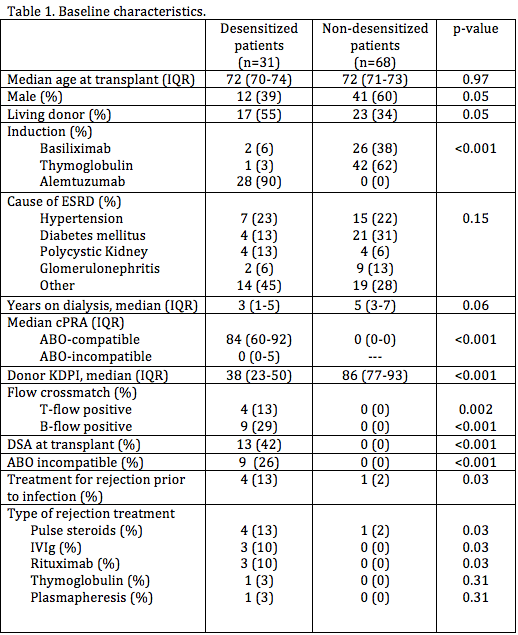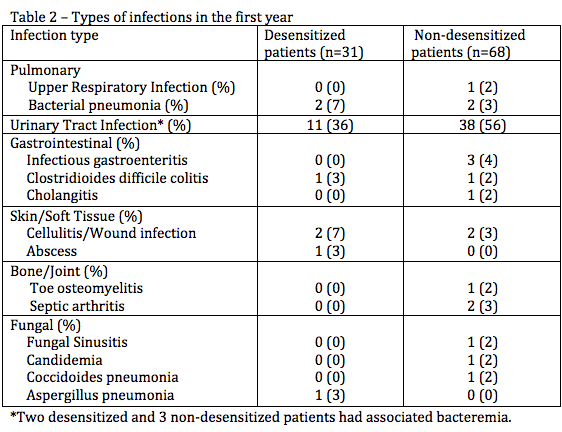Infectious Complications in Elderly Kidney Transplant Recipients Undergoing Desensitization
S. Sethi, R. Najjar, A. Peng, A. Vo, S. Jordan, E. Huang
Cedars Sinai Medical Center, West Hollywood, CA
Meeting: 2020 American Transplant Congress
Abstract number: D-169
Keywords: Elderly patients, Highly-sensitized, Infection, Kidney transplantation
Session Information
Session Name: Poster Session D: Kidney Infectious Excluding Polyoma & Viral Hepatitis
Session Type: Poster Session
Date: Saturday, May 30, 2020
Session Time: 3:15pm-4:00pm
 Presentation Time: 3:30pm-4:00pm
Presentation Time: 3:30pm-4:00pm
Location: Virtual
*Purpose: Data is limited on the impact of desensitization on infectious complications in elderly kidney transplant (KT) recipients. We examined infectious complications in elderly KT recipients who underwent pre-transplant desensitization compared to recipients who did not.
*Methods: Patients ≥70 yrs who received a KT at our center from 2010 to 2019 were included. Patients with cPRA≥30%, previous transplant or ABO incompatibility were considered high immunologic risk and desensitized with IVIG 2g/kg (1 or 2 doses) and rituximab 375mg/m2 prior to or at the time of transplantation. In addition, recipients of ABO incompatible living donor KT underwent 5-7 sessions of plasmapheresis. In order to assess the impact of pre-transplant desensitization on infections, we analyzed infections that developed in the first year only. Rate of total infections and serious infections, defined as those requiring hospitalization or leading to death, were compared between patients who received desensitization and those who did not.
*Results: Thirty-one patients who underwent desensitization were compared to 68 who did not (Table 1). Among desensitized recipients, 15 (48%) developed at least 1 infection in the first post-transplant year compared to 46 (68%) non-desensitized recipients (p=0.07). There were a total of 28 infections among desensitized and 79 infections among non-desensitized recipients. Types of infections are shown in table 2. The median time to first infection was 42 (IQR 24, 95) days in desensitized and 30 (IQR 19, 80) days in non-desensitized patients (p=0.73). Serious infections occurred in 8 (26%) desensitized and 24 (35%) non-desensitized patients (p=0.35), of which 3 led to death (desensitized=1; non-desensitized=2). On univariate logistic regression analysis, no factors were associated with development of infection.There was no difference in the percentage of patients who developed BK viremia [23% vs 19%; p=0.69] or CMV viremia (>1000 copies/ml) [36% vs 26%; p=0.36] in desensitized and non-desensitized recipients.
*Conclusions: Elderly desensitized KT recipients did not have an increased rate of infections in the first year despite higher immunosuppression exposure. Desensitization is safe in elderly KT recipients.
To cite this abstract in AMA style:
Sethi S, Najjar R, Peng A, Vo A, Jordan S, Huang E. Infectious Complications in Elderly Kidney Transplant Recipients Undergoing Desensitization [abstract]. Am J Transplant. 2020; 20 (suppl 3). https://atcmeetingabstracts.com/abstract/infectious-complications-in-elderly-kidney-transplant-recipients-undergoing-desensitization/. Accessed February 27, 2026.« Back to 2020 American Transplant Congress


